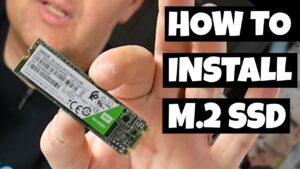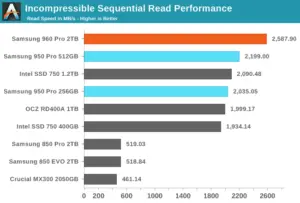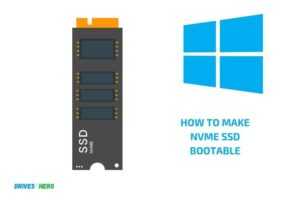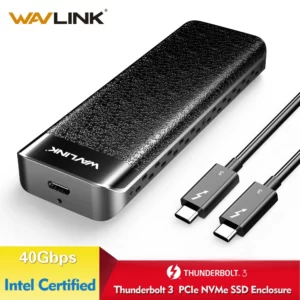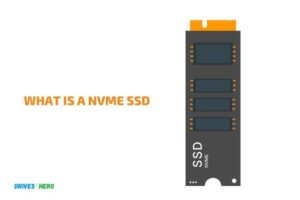What Is Nvme Ssd Drive – Understanding NVMe SSD
An NVMe SSD (Non-Volatile Memory Express Solid State Drive) is a high-performance storage device that utilizes the NVMe protocol to access and transfer data at faster speeds than traditional SSDs.
NVMe SSDs were developed to address the limitations of older storage protocols like SATA and SAS.
They are designed to take advantage of the faster speeds offered by modern PCIe (Peripheral Component Interconnect Express) interfaces, which provide significantly higher bandwidth and lower latency.
This results in improved performance, faster data transfer speeds, and reduced system bottlenecks.
In summary, an NVMe SSD is a cutting-edge storage solution that offers unparalleled speed and performance.
It leverages the NVMe protocol and PCIe interface to provide faster data transfer rates, making it the preferred choice for high-performance computing, gaming, and content creation workloads.
With various form factors available, users can find an NVMe SSD to suit their specific needs and requirements.
10 Attribute: What Is Nvme Ssd Drive
| Attribute | Description |
|---|---|
| Full Name | Non-Volatile Memory Express Solid State Drive |
| Acronym | NVMe SSD |
| Interface | PCIe (Peripheral Component Interconnect Express) |
| Storage Type | Solid State Drive (SSD) |
| Storage Medium | NAND Flash memory |
| Data Transfer Speed | Up to 3500 MB/s (Read), up to 3000 MB/s (Write) – depending on the specific NVMe SSD model |
| Protocol | NVMe (designed specifically for SSDs and faster than SATA/AHCI protocols) |
| Main Features | – Lower latency<br>- Higher IOPS (Input/Output Operations Per Second)<br>- Scalability |
| Common Use Cases | – Gaming<br>- Content creation<br>- High-performance computing<br>- Data center applications |
| Power Consumption | Generally lower than traditional hard disk drives (HDDs) |
| Form Factors | – M.2 (most common)<br>- U.2<br>- AIC (Add-in Card) |
Key Takeaway

Five Facts About Nvme Ssd Drive
What Are Nvme Ssd Drives?
Introducing The Technology Behind Nvme Ssd Drives
Nvme stands for non-volatile memory express, which is an advanced interface developed explicitly for ssds.
Ssds don’t need to move a read/write head across a spinning platter to locate the data, significantly reducing the time it takes to access and retrieve information.
Nvme ssd drives use this technology to perform even faster than typical sata (serial ata) ssds.
Highlighting The Differences Between Traditional Hard Drives And Ssd Drives
Hard disk drives (hdds) have been a standard approach to data storage for years. However, with the advent of ssds, the technology has been revolutionized.
Here are the differences between traditional hard drives and ssds:
- Traditional hard drives utilize spinning disks that read and write data with the help of magnetic heads. Whereas, ssds save data on flash memory chips and use an advanced controller to access this data.
- Ssds are incredibly fast as they use electronic circuits instead of mechanical components. In contrast, traditional hard drives are relatively slow compared to ssds.
- Traditional hard drives have a limited lifespan compared to ssds. Since traditional hard drives have moving components, they can get damaged quickly. On the other hand, ssds have a longer lifespan due to their electronic nature.
Explaining The Advantages Of Nvme Ssd Drives Over Conventional Hard Drives
Nvme ssd drives have several advantages over traditional hdds, such as:
- Speed: Nvme ssd drives are up to six times faster than traditional hard drives due to their advanced technology, which makes them ideal for situations that require quick data access and retrieval.
- Durability: Nvme ssd drives are more durable than traditional hard drives because they have no moving parts that can get damaged or easily fail.
- Space and form factor: Nvme ssd drives use less space than traditional hard drives. Also, they have a smaller form factor, making them ideal for use in smaller devices like laptops, tablets, and even smartphones.
- Energy-efficient: Nvme ssd drives need less power to operate than traditional hard drives, making them an eco-friendly option.
Nvme ssd drives use advanced technology to offer better speed, durability, form factor, and energy efficiency than traditional hard drives.
They are the future of data storage, and you should consider upgrading to an nvme ssd drive for your next system update.
How Do Nvme Ssd Drives Work?
Understanding The Architecture Of Nvme Ssd Drives
Non- volatile memory express or nvme ssd drives are the new form of storage devices which are built on a completely different architecture than the traditional hard disk drives.
Some of the key features of the architecture are:
- The architecture is designed to work with nand memory in a more efficient way as compared to traditional ssds.
- It uses a pcie interface which means that it can handle much larger amounts of data as compared to sata based storage.
- The nvme architecture is designed to reduce latency by communicating directly with the cpu.
- Nvme ssd drives offer multi-queue support that facilitates parallel execution of requests leading to reduced latency.
Discussing How Data Is Read And Written In Nvme Ssd Drives
The data in nvme ssd drives is accessed through various channels controlled by their respective controllers. Data is accessed through pcie lanes instead of sata as in the case of traditional ssds.
Some of the ways through which data is read and written to nvme ssd drives are:
- Random access: Nvme ssds use a random access method that allows accessing the data faster and more efficiently.
- Parallelism: Nvme ssds use various fast lanes of pcie to read multiple data blocks simultaneously, leading to faster data processing.
- Nand gates: It uses nand gates that store data in flash memory cells which can be accessed by the ssd controllers much more efficiently.
Highlighting The Performance Benefits Of Nvme Ssd Drives
Nvme ssd drives have multiple advantages over traditional hard disk drives (hdds) and traditional ssds.
Some of the performance benefits of nvme ssd drives are:
- Nvme ssds offer faster speeds because of their pcie interface, which can help in reducing the latency of the system.
- It ensures faster access because of their multi-queue capability. This allows multiple threads to access the storage simultaneously, thus increasing speed further.
- The nvme architecture is designed to work faster with a larger number of input/output operations (iops) than traditional ssds.
- Nvme ssds typically come with smaller form factors that make them more portable and reliable when it comes to handling large amounts of data.
Nvme ssd drives offer many performance benefits over traditional ssds and HDDs.
Their architecture and design philosophy makes them suitable for applications that require high-speed read/write times, reduced latency and multiple i/o support.
The Advantages Of Nvme Ssd Drives
Nvme ssd drives are widely popular in today’s world of technology. Below are some of the advantages of nvme ssd drives that make them a go-to choice for businesses and consumers alike.
Accelerated Boot Speed And Application Loading Times
Nvme ssd drives provide faster boot-up times and application loading speeds compared to traditional hard drives.
This is because of the nvme’s faster interface, which allows for quicker communication between the ssd and the computer’s processor.
Some benefits of this include:
- Boot times that are up to four times faster than traditional hard drives
- Quicker application launch times, making it easier to get started with work and boosting productivity
- Users can save precious time, especially when running applications such as video editing software, cad software, and large games that require intensive computing resources
High-Speed Data Transfer And File Handling
Nvme ssd drives offer faster data transfer rates and file handling speeds than traditional hard drives.
This can provide a number of benefits, including:
- Faster data transfer between devices, resulting in a more efficient transfer of files and data
- Effortless data sharing between colleagues or friends
- Improved large file transfers, perfect for those who work with large files such as video editing jobs or medical imaging
Reduced Power Consumption And Cool Operation
Nvme ssd drives need less power to operate, and as a result, they run cooler than traditional hard drives.
This has a slew of advantages, including:
- Lower electricity bills, especially for businesses operating with large computer setups.
- Less wear and tear on the system due to cool operation, ensuring longevity of the device.
- Quieter operation since cooling fans do not have to work as hard to cool the device.
Improved Durability And Resistance To Physical Damage
Nvme ssd drives are more durable than traditional hard drives, and are resistant to physical damage due to their design.
Their benefits include:
- Ssds are less susceptible to physical damage as they have no moving components, which increases their longevity.
- Data stored on an ssd is less prone to corruption due to the lack of moving parts.
- Resistance to external vibrations makes nvme ssds perfect for use in rugged environments, such as in military or industrial installations.
Nvme ssd drives offer more benefits than traditional hard drives, and their use in computer systems can lead to a more efficient and productive workflow.
With faster boot times, improved file handling and sharing, lower power consumption, cooler operation, and increased durability, nvme ssd drives can be an excellent investment for both businesses and consumers alike.
Choosing Nvme Ssd Drives: What You Need To Know
Are you considering upgrading your computer to an nvme ssd drive?
These solid-state drives are faster and more efficient than traditional hard drives, which means faster boot times, quicker file transfers, and overall better performance.
But before you make the leap, it’s essential to know what to look for when choosing an nvme ssd drive.
Here are some factors you need to consider:
Discussing Key Factors To Consider When Selecting Nvme Ssd Drives
When you’re in the market for an nvme ssd drive, keep these critical factors in mind:
- Storage capacity: The drive’s storage capacity is probably one of the most important factors to consider. You’ll want to choose a drive that has enough storage space for your needs. Depending on what you plan to do with your computer, you may want to opt for a higher-capacity drive.
- Read and write speeds: One of the primary benefits of an nvme ssd drive is that it can deliver faster read and write speeds than traditional hard drives. Look for a drive with high read and write speeds, especially if you plan on using it for gaming or editing large files.
- Price: The cost of an nvme ssd drive can vary widely, depending on the brand and model. Set a budget before you start shopping and try to find the best drive you can within your price range.
Examining Compatibility And Requirements
Before making a purchase, it’s crucial to ensure that your computer is compatible with a nvme ssd drive. Check your computer’s documentation or contact the manufacturer to find out if your computer supports a nvme ssd drive. Additionally, consider the following:
- Form factor: Nvme ssd drives come in various form factors, such as m.2 or u.2. Make sure you choose a form factor that is compatible with your computer’s motherboard.
- Capacity limits: Some older motherboards have capacity limitations for nvme ssd drives. Be sure to check your motherboard’s documentation to find out if there are any limitations on the size of the drive you can install.
- Cooling requirements: Nvme ssd drives can generate significant amounts of heat. Make sure your computer has adequate cooling to prevent overheating.
Comparing Brands And Models Of Nvme Ssd Drives
When comparing brands and models of nvme ssd drives, consider the following:
- Brand reputation: Look for well-known, reputable brands that have a history of producing high-quality drives.
- Reliability: Choose a drive that has a high reliability rating. You want a drive that will last as long as possible.
- Warranty: Look for an nvme ssd drive with a good warranty. Most manufacturers offer three to five-year warranties, but some may offer longer. Choose a drive with a good warranty to protect your investment.
By examining the compatibility, key factors, and differences between brands and models of nvme ssd drives, you can make an informed decision when purchasing the perfect nvme ssd drive for your needs.
FAQ
What Is An Nvme Ssd Drive?
A nvme ssd drive is a high-performance storage device that connects to a computer’s motherboard.
How Does An Nvme Ssd Drive Work?
A nvme ssd drive uses pcie technology to communicate directly with the cpu, making it much faster than traditional hard drives.
What Are The Benefits Of An Nvme Ssd Drive?
A nvme ssd drive improves system performance, reduces boot and load times, and enhances overall user experience.
Are Nvme Ssd Drives Worth The Investment?
Yes, nvme ssd drives are worth the investment if you want to improve the performance of your computer. They offer significant speed improvements over traditional hard drives.
Conclusion
Nvme ssd drive is a newer standard that has revolutionized the data storage industry. It’s faster, more efficient, and provides faster access to data.
Nvme ssds are a great investment for those who depend on high-speed data transfers. It can help optimize the overall system performance of modern computing devices.
As more and more companies adopt nvme technology, the prices will become more reasonable, making it possible to replace slower drives in existing machines with the new technology.
Nvme ssds are taking the storage industry by storm, and it’s no wonder that they are the future of data storage.
So, if you want to upgrade the speed of your machine, consider investing in an nvme ssd drive. Nvme ssd drive is a superior alternative to traditional hard drives, providing a faster, more reliable and efficient way of storing and accessing data.
The future of data storage lies in nvme ssds, and as we continue to create more data, investing in nvme technology will become increasingly important.

